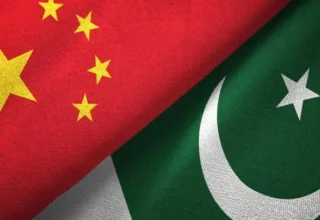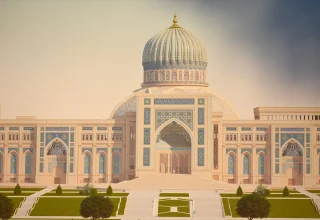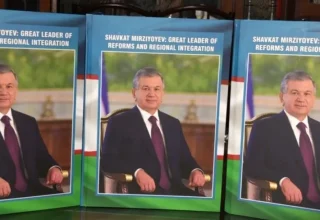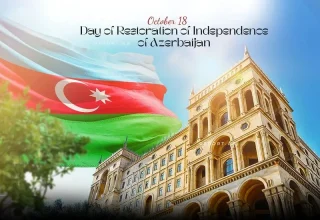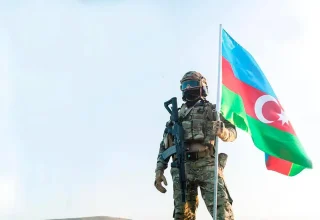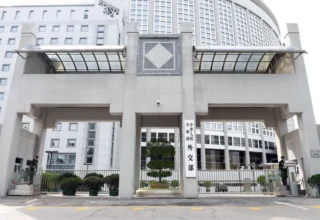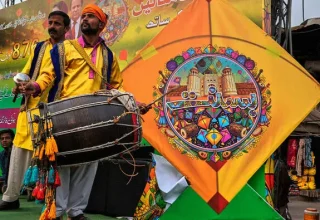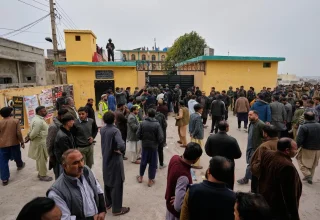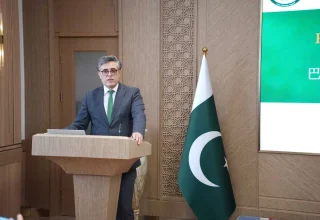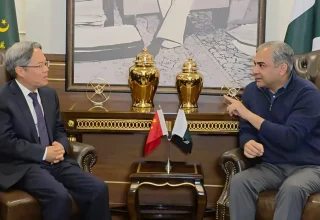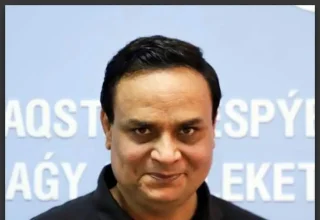
Most recently, the Republic of Kazakhstan hosted the 21st meeting of the Secretariat of Congress of Leaders of World and Traditional Religions in Astana on Oct. 11 which has once again “showcased” the true essence of its “Religious Diplomacy” and “Soft Image Projection”.
Since centuries, Kazakhstan has been the “Land of Spirituality” and “Supreme Human Traits”. It has also been famous as “Land of Martyrs” and of Believers”; “Land of Expatriates” and of Heroes” and “Land of “Intellectuals” and Artists”. It has embracing a “glorious history” of culture, humanity and services to humanity. Last but not least, it has been known as a bridge between Europe and Asia and a junction between East and West.
In this connection, it has one of the biggest ethnic groups (550) and the over 80 languages present in the country which have their own diverse histories and cultural and religious traditions, represent an extraordinary holy connection making Kazakhstan a unique multiethnic, multicultural and multi-religious land in the world.
The statistical data of its national consensus upholds that Kazakhstan hosts many religions even though 70 percent of the population identifies as Muslim, and mostly Sunni Islam. Orthodox Christianity, mainly Russian Orthodox, is the religion for 26 percent of the population, and Catholics of German, Lithuanian, and Polish descent make up 1.5 percent. Buddhist, Baha’i and Jewish communities are also present in the country. Still it has highest level of interfaith harmony and religious tolerance in the country, region and beyond which should be appreciated.
Right from the beginning and specially H.E. Kassym-Jomart Tokayev the president of Kazakhstan has succeeded to build an inclusively tolerant society that promotes ethnic dialogue and harmony. Definitely, the Assembly of the People of Kazakhstan (APK) plays an important role in this.
The joint declaration of the seventh congress clearly demonstrated the serious intention to develop the dialogue platform, to further strengthen cooperation between religions, cultures and civilizations. In this regard, they rightly termed strengthening and promoting of inter-religious dialogue and cooperation vital for peace, harmony and development in the region and around the globe. They labeled spiritual diplomacy as the way forward for conflict resolution and promoting the spirits of dialogue, diplomacy and development in the world.
Moreover, it is good omen that world religious leaders approved the development concept of the Congress of Leaders of World and Traditional Religions for the next ten years during the 21st session of the secretariat of the congress.
The comparative study of the New Constitution of Kazakhstan defines it as a secular state. It surely provides freedom of religion and belief. Its essential secularity plays an important and indispensable role in the religious harmony, resisting all forms of extremism. It secures the concept of modern civilization and political history pertaining to equal treatment of each citizen and replicates to all its ethnic, linguistic, cultural and religious groups.
It is commendable that Kazakhstan’s religious diplomacy and traditions represents the best channel for civil coexistence. It plays a potential role in prevention and resolution of conflicts as well as in prevention of radicalization.
For centuries, Kazakhstan is known for its capacity to keep creating harmony between parallel religions, faiths, traditions, civilizations, cultures and means of livings. It has two souls, Asiatic and European, which give it a permanent mission of linking two continents.
Undoubtedly, Kazakhstan is a nation renowned for its rich cultural diversity, multi-ethnic society, and its spiritual traditions have emerged as a global beacon of interfaith harmony and understanding.
It is crystal clear that in the last twenty years, Kazakhstan’s Congress of Leaders of World and Traditional Religions has played an influential role in promoting dialogue, forging unity, and advocating for peace among diverse faiths worldwide. Thus it provides an ideal platform for grand interfaith dialogue and civilizational interaction removing all political, psychological and philosophical differences through integrated wisdom and tolerance. It has now become iconic symbol of international cooperation and tolerance.
The Congress of Leaders of World and Traditional Religions, initiated by Kazakhstan in 2003, stands as a testament to the nation’s deep spirituality and wisdom. It promoted interfaith dialogue, fostered mutual understanding, and advanced global peace.
The splendid success of this initiative has many important factors mainly constant & continued institutionalization of “Interfaith Harmony”, “Promotion of Peace”, “Cultural Diversity”, “Neutrality and Diplomacy”, “Commitment to Religious Freedom, Cultural Exchange, “Addressing Contemporary Issues” and last but not least “President Tokayev’s vision for the future & Peace”.
In summary, numerous research studies and publications of the World Bank, IMF and ADB reveal that religious harmony plays an important role in the socio-economic development in the world. It shuns all kinds of discriminations and promotes economic prosperity and political stability. Even the ancient Islamic history/governance system, Walled City’s Democracy of Greeks, Egyptian Orthodox Religious Diplomacy, Moroccan Religious Bureaucratic Diplomacy, Vatican Diplomacy and last but not least European Coptic Religious Diplomacy all stand for interfaith harmony and tolerance to achieve socio-economic prosperity, safety and security for all contributing for socio-economic development and eradicating discriminations. In this regard, Kazakhstan’s religious diplomacy and interfaith initiative is the prime example of its marvelous ancient history and fabulous present.
During the just concluded international congress, president Tokayev rightly emphasizes the shared principles of all religions, such as the sanctity of human life, mutual support, and the rejection of destructive rivalry and hostility, as the foundation for a new world system focused on peace.
Moreover, president Tokayev suggested practical ways in which religious leaders can contribute to world peace, including healing societal wounds following conflicts, preventing negative trends that undermine tolerance, and addressing the impact of digital technology on society. He termed cultivation of spiritual values and moral guidelines necessary to navigate the challenges posed by rapid technological advancements.
In this regard, Kazakhstan’s Congress of Leaders of World and Traditional Religions has become a beacon of hope in an increasingly divided world. President Tokayev’s visionary leadership towards interfaith dialogue promises a brighter future of unity, tolerance, and cooperation among diverse faiths. Hopefully, in the increasing polarization and divided world Kazakhstan’s religious diplomacy and interfaith dialogue reminds will be beacon of hope for a more peaceful and harmonious global society.
It seems that Kazakhstan under the President Tokayev’s leadership continues to illuminate the path to global harmony and unity, demonstrating the power of dialogue, mutual understanding, and the enduring human spirit.
Its rich multiculturalism fusion the various cultures that bridges East and West, Islam and Christianity, and various other belief systems. Kazakhstan steadily exhibits its commitment to religious freedom and tolerance within its borders, aligning with the principles at the core of the congress’s mission.
Last but not least, Tokayev recognizes the importance of strengthening inter-civilizational dialogue and trust for promoting the spirits of interfaith harmony and religious diplomacy in the world. Kazakhstan’s religious diplomacy facilitates cooperation and acts as indispensable agent of change in building a new system of international security.














